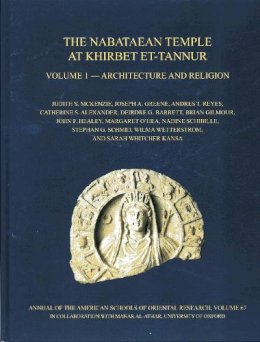Judith S. McKenzie won the Archaeological Institute of America Wiseman Book Award for The Architecture of Alexandria and Egypt, 300 B.C.–A.D. 700 (Pelican History of Art, Yale University Press, 2007). She was University Research Lecturer in Oriental Studies, University of Oxford, and Director of the Khirbet et-Tannur project. Joseph A. Greene is Deputy Director and Curator of the Semitic Museum, Harvard University, and Series Editor of the Annual of the American Schools of Oriental Research. Andres T. Reyes is member of Wolfson College, Oxford. He is an archaeologist who teaches Greek and Latin at Groton School. He is the author of Archaic Cyprus (Oxford University Press) and editor of C. S. Lewis’s Lost Aeneid (Yale University Press). Catherine S. Alexander is an archaeological artist for the Archaeological Expedition to Sardis (Turkey), Harvard University. Deirdre G. Barrett is a Research Associate of the Semitic Museum, Harvard University, and a specialist in ancient lamps. Brian Gilmour is a metallurgist at the Research Laboratory for Archaeology and the History of Art, University of Oxford. John F. Healey is Professor of Semitic Studies at Manchester University. Margaret O’Hea is Senior Lecturer in Classics, University of Adelaide (Australia). Nadine Schibille is Lecturer in Byzantine at History, University of Sussex (England), and was a research chemist at the Research Laboratory for Archaeology and the History of Art, University of Oxford. Stephan G. Schmid is Professor of Classical Archaeology at the Winckelmann-Institut, Humboldt University, Berlin. Wilma Wetterstrom is Research Associate in Botany in the Harvard University Herbaria. Contributors Sara Whitcher Kansa is Executive Director of the Alexandria Archive Institute (Berkeley, CA), Editor of Open Context, and a specialist in zooarchaeology. Kate da Costa is Honorary Research Affiliate in Archaeology, University of Sydney, and a specialist in ancient lamps. Patrick Degryse is Research Professor of Earth and Environmental Sciences at the Geology Centre for Archaeological Sciences, University of Leuven (Belguim). The late Sheila Gibson was an archaeological artist best-known for her reconstruction drawings in J. B. Ward-Perkins’ Roman Imperial Architecture. Owen Gingerich is Professor Emeritus of Astronomy and History of Science at Harvard University. Elias Khamis is Research Associate in Classics, University of Oxford, and a specialist in ancient metal work.
'This final report on an excavation carried out decades ago is a fine achievement. McKenzie and her team should be congratulated for this important contribution to Nabataean history, architecture and art, and religious practice.' Joseph Patrich, Journal of Roman Archaeology, Vol 30, 2017 'Rarely has this reviewer seen so useful and attractive an excavation report. This is all the more impressive because of the viscissitudes of attempting to integrate the evidence for an excavation of 80 years ago, performed under the strictures of that era and whose records and material cultuire are widely dispersed, with teh present state of the site - an immense task admirably performed by the principla investigator and her colleagues. The hundreds of plans and illustrations, both contemporary and historic and many in color, enhance the report. The nbarrative is clear, concise and informative, and the cataloges are useuful but not intrusive. This is a model publication about a little-known yet essential part of teh ancinet world, revealing a aite whose interpretation has languished for half a century.' Duane W. Roller, American Journal of Archaeology, Vol 120 No 3 (July 2016) 'All these studies are extremely useful because they make an enormous amount of old and often unknown material available to scholars, not only those interested in the Nabataeans but also those interested in the ancient Middle East in general, in religion and rituals, in technology and in various sorts of archaeological material. 'The enormous number of documents studied by the authors, their nature (an archive), and the fact that the excavation took place more than seventy years ago added to the complexity of the project and made this publication a real tour de force.' (Laila Nehme, Bryn Mawr Classical Review, June 2015)

